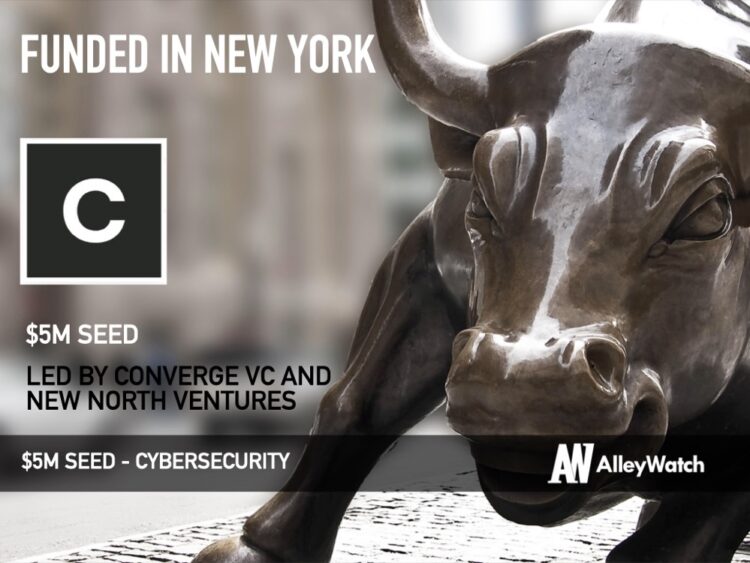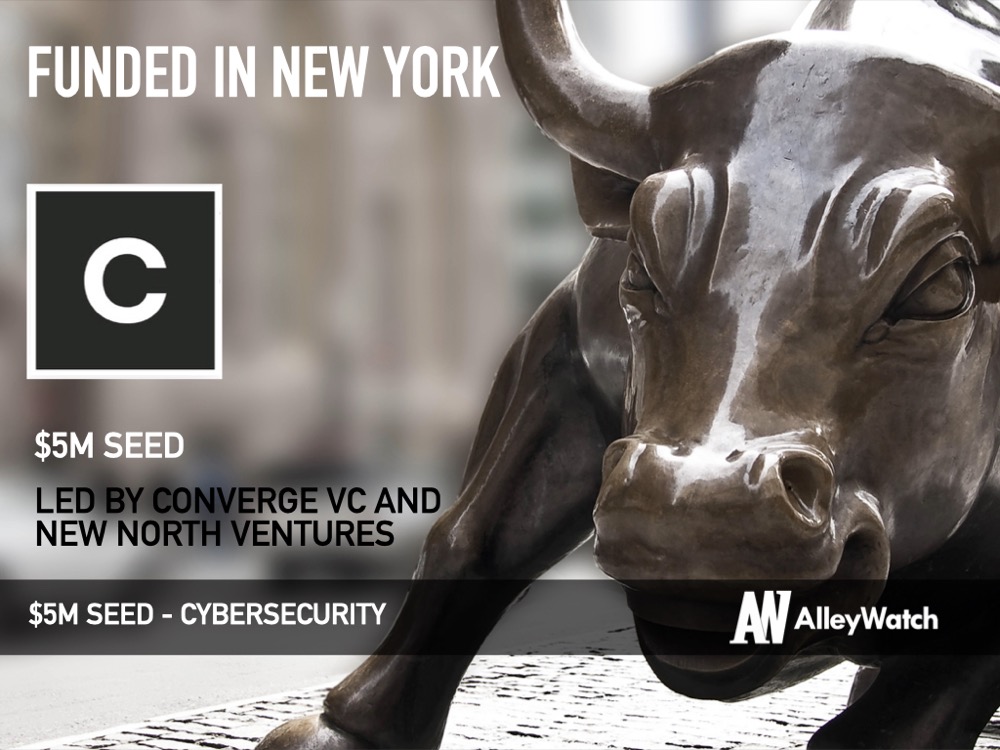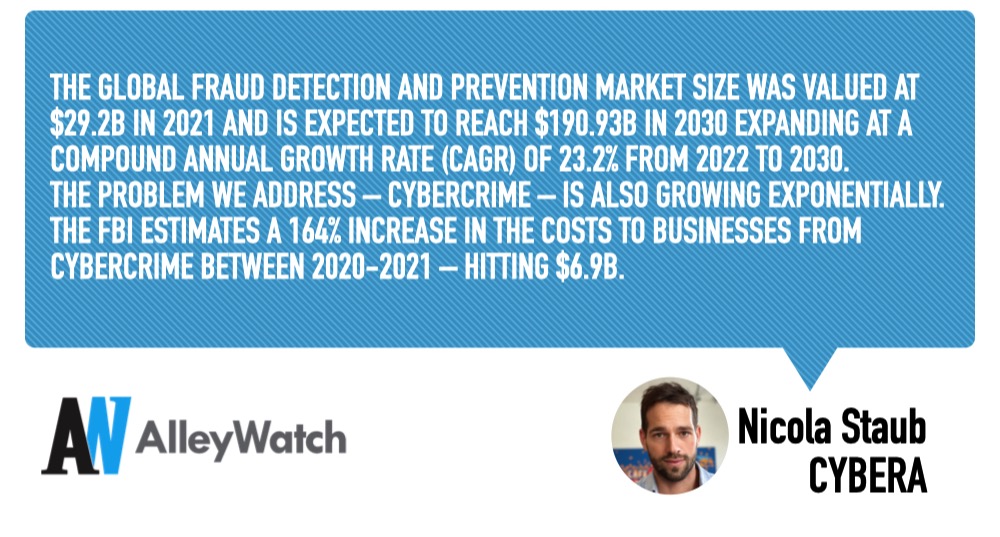Cybercrime is expected to cost $10.25T annually by 2025, larger than all but two nations’ economies (China and US). Organizations across the globe are scrambling to minimize their risk exposures while reducing incentives and innovation on the part of would-be cybercriminals. CYBERA is a cybercrime intelligence and reporting platform that specializes in providing law enforcement and financial institutions with real-time actionable information. The company features two signature solutions – CYBERCRIME COMPLAINT, a real-time cybercrime reporting platform to coordinate the legal response, and CYBERCRIME WATCHLIST, a platform that provides intelligence for companies to access cybercrime information to prevent incidents before they happen. Most cybersecurity companies focus on preventing incidences by reducing the possibility of a technical breach but CYBERA’s approach is to take a more traditional law enforcement-focused approach to intelligence and information gathering to prevent crimes from happening by increasing the likelihood that bad actors in the financial ecosystem will get caught and caught quickly.
AlleyWatch caught up with Cybera CEO and Cofounder Nicola Staub to learn more about the business, the company’s strategic plans, latest round of funding, and much, much more…
Who were your investors and how much did you raise?
Our company has raised $5M in seed investment. Converge VC and New North Ventures led the round. Other major investors include David Frankel from Founder Collective who recently made #11 of Forbes VC Midas list, and Serpentine Ventures as well as Correlation Ventures, CV VC, Blu Ventures, K20 Fund, and Dreamit Ventures. Private Investors include the former CEO of the largest Swiss bank UBS, Marcel Rohner, who is today the ‘highest’ Swiss Banker as President of the Swiss Banker’s Association.
Tell us about the product or service that Cybera offers.
CYBERA is on track to becoming the category-defining company enabling victims, the financial industry, and law enforcement to use innovative technology solutions to act fast against these criminals:
- CYBERCRIME COMPLAINTTM – the go-to cybercrime reporting platform coordinates a global legal response to support victims, banks, VASPs, and law enforcement.
- CYBERCRIME WATCHLISTTM – the world’s first scalable way to share actionable cybercrime information, enables financial institutions and crypto businesses to stop more fraud and money laundering even before the losses occur.
 What inspired the start of Cybera?
What inspired the start of Cybera?
I’m an ex-attorney, and have got all the battle scars from the law enforcement side, so we started this business with a passion to fight crime. It was a combination of the realization that cybercrime, in particular fraud and online scams, is the leading crime today with billions going to organized crime and devastating effect for victims and the financial sector alike. It was when we realized the need for coordinated global alignment that we started CYBERA – o address this clear gap.
How is Cybera different?
We focus on stopping cybercriminals from cashing out. Most cybersecurity companies focus on technical prevention but cybercriminals always find ways and most often use social engineering to trick victims out of their funds. No effective solution exists today to block the crime itself – but if we can make it unprofitable then we might be able to stop the criminal from committing the crime.
What market does Cybera target and how big is it?
The global fraud detection and prevention market size was valued at $29.2B in 2021 and is expected to reach $190.93B in 2030 expanding at a compound annual growth rate (CAGR) of 23.2% from 2022 to 2030.
The problem we address – cybercrime – is also growing exponentially. The FBI estimates a 164% increase in the costs to businesses from cybercrime between 2020-2021 – hitting $6.9B.
What’s your business model?
Our primary audiences are financial institutions such as banks, cyber businesses, and law enforcement. We are also seeing great partnerships with other fintechs who work with the financial sector to partner up and provide CYBERA solutions on existing platforms.
How are you preparing for a potential economic slowdown?
It is an unfortunate reality that cybercrime also rises during an economic slowdown. We have a primarily B2B model and given the projected growth of the fraud prevention market, we feel confident that our solutions will continue to see demand over the coming period.
What was the funding process like?
It is exciting talking to people who share your vision, and believe in the potential of your business. It’s also hard, and long, and stressful, but the excitement carries you through – that’s what being a founder is all about! As a founder, we look for partners with a track record of innovation, who have been a first mover in identifying other start-ups to target for investment.
What are the biggest challenges that you faced while raising capital?
We were oversubscribed, so I would say the biggest challenge was closing the funding round, and deciding what would be the best fit for our business at this stage of our journey. We had really great partners in Converge and New North Ventures, helping us make these calls. There is also an element of market fit – whether they are well versed and active in the market we need to enter, and whether they speak our language and are as excited about the opportunity as we are.
We were oversubscribed, so I would say the biggest challenge was closing the funding round, and deciding what would be the best fit for our business at this stage of our journey. We had really great partners in Converge and New North Ventures, helping us make these calls. There is also an element of market fit – whether they are well versed and active in the market we need to enter, and whether they speak our language and are as excited about the opportunity as we are.
What factors about your business led your investors to write the check?
We were able to show our investors proven execution credentials, literally demonstrating how we have frozen proceeds of cybercrime and been able to track ‘bad actors’ in the financial system and flag their details to prevent them from moving their ill-gotten gains.
What advice can you offer companies in New York that do not have a fresh injection of capital in the bank?
Meetings, meetings, networking, and more meetings. It’s true that although part of being a founder is having a great idea, a massive part of it is finding the people who can support you to bring it to its full potential.
Where do you see the company going now over the near term?
We’re scaling our products, to get them into more institutions and hit that critical acceleration point where more people know about the watchlist and reporting tool than do not! We are also a remote-first company, with team members all over the world, and we’re seeing this model pay off with interesting conversations and opportunities happening from Melbourne to New York.
What’s your favorite restaurant in the city?
It has to be Misi, in Williamsburg!






